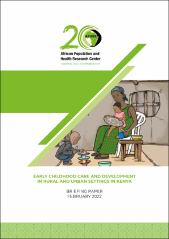| dc.contributor.author | Kimani-Murage, Elizabeth et al. | |
| dc.contributor.author | Mwaniki, Elizabeth | |
| dc.contributor.author | Haycraft, Emma | |
| dc.contributor.author | Elsey, Helen | |
| dc.date.accessioned | 2023-05-15T05:40:49Z | |
| dc.date.available | 2023-05-15T05:40:49Z | |
| dc.date.issued | 2022-02 | |
| dc.identifier.uri | http://10.176.203.77/handle/123456789/76 | |
| dc.description.abstract | Informal childcare centers have sprung up to meet the growing demand for child care in urban
informal settlements. This has resulted from the significant increase in the number of women
engaging in paid employment outside the home. However, childcare providers running these
centers have little or no training and the facilities are below standard. This situation puts the
children under the paid care facilities at risk for poor health and development outcomes.
Community health teams which consist of Community Health Assistants (CHAs) and Community
Health Volunteers (CHVs), are a considerable asset within urban areas in Kenya. These teams that
are facilitated under the management of the local county governments, attend to the health and
wellness of the communities. Our study aimed to co-design and test the feasibility of a system for
supportive assessment and skill-building of childcare providers with the support of CHVs. The
long-term vision of the project is to improve the quality of paid childcare for children in poor urban
settings. | en_US |
| dc.description.sponsorship | The British Academy | en_US |
| dc.language.iso | en | en_US |
| dc.publisher | APHRC | en_US |
| dc.subject | Early Childhood Development | en_US |
| dc.subject | Childcare Providers | en_US |
| dc.subject | Nairobi Early Childcare in Slums | en_US |
| dc.subject | NECS | en_US |
| dc.title | Early Childhood Care and Development In Rural and Urban Settings in Kenya | en_US |
| dc.type | Working Paper | en_US |

